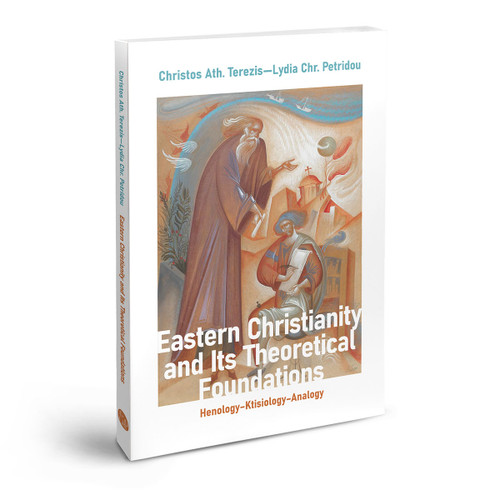Freedom and Existence: The Transition from Ancient to Christian Hellenism. Five Lectures at the Goulandris-Horn Foundation (1983)
$30.00
- SKU:
- SP-BK-DT-2024-001
- Author:
- John D. Zizioulas, Metropolitan of Pergamon
- Translator:
- Bishop Maxim Vasiljević
- ISBN:
- 978-1-964233-09-3
- Book Details:
- Paperback · duotone · 5.7 × 8 × 0.5 in · 176 pages · English (Latin) · Publisher: Sebastian Press · 2024
Freedom and Existence presents a series of five insightful lectures by Metropolitan John, exploring the profound encounter between Hellenism and Christianity. The book delves into the philosophical, cultural, and theological exchange between these two traditions, highlighting how Christianity transformed and integrated critical elements of Hellenism into its message. This transformation shaped early Christian thought and left a lasting impact on the future of Orthodoxy and the development of modern Hellenism and Christian theology, explored in the last three essays.
"Hellenism and Orthodoxy must once again open their horizons to the existential problems of humanity, as the Church Fathers once did in their time. Hellenism and Orthodoxy are not goods to be preserved or boasted about. They are a duty of creation."
Metropolitan John D. Zizioulas
"The interest of Metropolitan John Zizioulas of Pergamon in the history and significance of the relationship between Hellenism and Christianity has deep theological roots and premises and represents the beginning of his scientific journey and contribution. By utilizing and deepening the theological heritage of Fr. Georges Florovsky on “Christian Hellenism,” John Zizioulas explored the encounter, the conflict, and also the synthesis of Hellenism and Christianity in late antiquity in an original and systematic way.
Through systematic study of historical sources, without slipping into an exclusively cultural or narrowly confessional understanding, he examined in an ecumenical theological perspective the various aspects of the complex encounter between Hellenism and Christianity, particularly concerning the crucial and existential issues of God, the world, humanity, and history. From his theological research and study, freedom and the person emerge as fundamental interpretive keys as well as structural ontological categories for the fruitful and creative synthesis of Hellenism and Christianity, which the Greek Fathers of the Church developed by combining the biblical spirit with the interests and inquiries of Greek thought and mentality."
Dr Stavros Yangazoglou, Associate Professor of Dogmatics—University of Athens
"A fundamental transformation of Hellenism that resulted from its Christianization was the reconsideration of humanity. From being a microcosm within the macrocosm, an element that exists for the sake of the whole world, as Plato says in a passage we referred to in a previous lesson (“you exist for the world, and not the world for you”), man is created last to give meaning to the world and to govern it as a king.
Human freedom is absolute, to the point where God Himself does nothing to violate it. That is why the greatest gift from God to man is time, within which man can exercise his freedom. In that time, he will struggle with everything, create history, generate new events, new beginnings, fall and rise, repent and start anew. Time, from being a necessity and a rhythmic cycle of eternity, an endless image of eternity as in Plato, became the field of freedom, the space for creating new things, new events. Neither the past nor the present binds definitively; there is always a future that liberates from the past."
Metropolitan John D. Zizioulas
"The identity of modern Hellenism must transcend its division into “ancient” and “Byzantine” if it wants to contribute creatively to the cultural development of our times. It must also overcome the “Helladism” (a narrowing of Hellenism) which restricts its horizons, and rediscover the universality that the Church Fathers imparted to it. It must understand that its place is not in opposition to the West, in some exotic East, but in the heart of our cultural reality, so that Greek identity is drawn not from barren oppositions and contrasts but from creative positions. Hellenism must regain the vigor of its creative presence in the world to come, and it can achieve this only if it conveys to that world the elements that the Greek Fathers imparted to it and which we have tried to outline in this speech: elements of utmost existential significance."
Metropolitan John D. Zizioulas
Metropolitan of Pergamon John D. Zizioulas (1931-2023), a renowned modern theologian and Metropolitan of Pergamon in the Ecumenical Patriarchate of Constantinople, is known for his significant contributions to Christian theology. He earned his doctorate in theology from the University of Athens and held academic positions at various universities. He was a professor of Systematic Theology at the Universities of Edinburgh, Glasgow, and Thessaloniki and a visiting Professor at King's College in London. Metropolitan John became a regular member of the Academy of Athens in 1993 and its president in 2002-2003. His extensive ecumenical involvement and scholarly work resulted in numerous influential publications, solidifying his reputation as a leading Orthodox theologian of our time. He is generally recognized as the most brilliant and creative theologian in the Church, dealing with the most contemporary issues facing humanity today.























